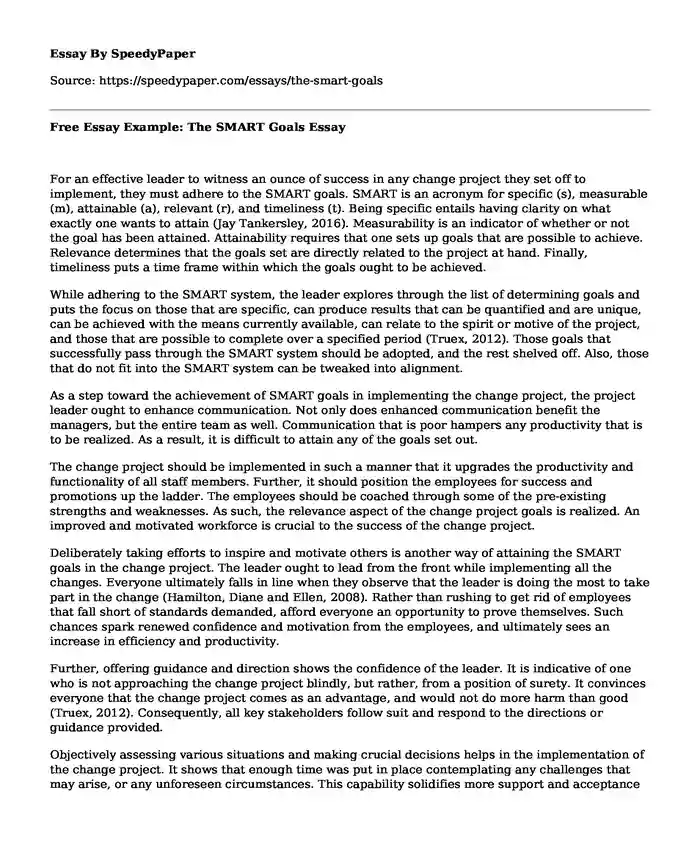
| Type of paper: | Essay |
| Categories: | Leadership analysis Goal Human resources Organizational behavior |
| Pages: | 3 |
| Wordcount: | 752 words |
For an effective leader to witness an ounce of success in any change project they set off to implement, they must adhere to the SMART goals. SMART is an acronym for specific (s), measurable (m), attainable (a), relevant (r), and timeliness (t). Being specific entails having clarity on what exactly one wants to attain (Jay Tankersley, 2016). Measurability is an indicator of whether or not the goal has been attained. Attainability requires that one sets up goals that are possible to achieve. Relevance determines that the goals set are directly related to the project at hand. Finally, timeliness puts a time frame within which the goals ought to be achieved.
While adhering to the SMART system, the leader explores through the list of determining goals and puts the focus on those that are specific, can produce results that can be quantified and are unique, can be achieved with the means currently available, can relate to the spirit or motive of the project, and those that are possible to complete over a specified period (Truex, 2012). Those goals that successfully pass through the SMART system should be adopted, and the rest shelved off. Also, those that do not fit into the SMART system can be tweaked into alignment.
As a step toward the achievement of SMART goals in implementing the change project, the project leader ought to enhance communication. Not only does enhanced communication benefit the managers, but the entire team as well. Communication that is poor hampers any productivity that is to be realized. As a result, it is difficult to attain any of the goals set out.
The change project should be implemented in such a manner that it upgrades the productivity and functionality of all staff members. Further, it should position the employees for success and promotions up the ladder. The employees should be coached through some of the pre-existing strengths and weaknesses. As such, the relevance aspect of the change project goals is realized. An improved and motivated workforce is crucial to the success of the change project.
Deliberately taking efforts to inspire and motivate others is another way of attaining the SMART goals in the change project. The leader ought to lead from the front while implementing all the changes. Everyone ultimately falls in line when they observe that the leader is doing the most to take part in the change (Hamilton, Diane and Ellen, 2008). Rather than rushing to get rid of employees that fall short of standards demanded, afford everyone an opportunity to prove themselves. Such chances spark renewed confidence and motivation from the employees, and ultimately sees an increase in efficiency and productivity.
Further, offering guidance and direction shows the confidence of the leader. It is indicative of one who is not approaching the change project blindly, but rather, from a position of surety. It convinces everyone that the change project comes as an advantage, and would not do more harm than good (Truex, 2012). Consequently, all key stakeholders follow suit and respond to the directions or guidance provided.
Objectively assessing various situations and making crucial decisions helps in the implementation of the change project. It shows that enough time was put in place contemplating any challenges that may arise, or any unforeseen circumstances. This capability solidifies more support and acceptance of the change project.
Finally, the leader’s ability to work with a team is crucial to the achievement of the SMART goals. The success of any organization is reliant on its members being able to work collectively and harmoniously. Further, the leader often inherits an existing team and should focus on being able to work with the team as it is (Marquis & Huston, 2017). Any random and abrupt changes could prove disastrous and hinder any chances of having success in the change project.
References
22 Change Management Objectives. (2010). Retrieved July 09, 2020, from https://management.simplicable.com/management/new/22-change-management-objectives
An Example of Smart Goals for a Change Management Process. (2011, March 24). Retrieved July 09, 2020, from https://www.brighthubpm.com/change-management/111438-examples-of-smart-goals-for-change-management/
Hamilton, D.K., Robin Diane, W Ellen. Organizational Transformation: A Model for Joint Optimization of Culture Change and Evidence-Based Design: Health Environments Research & Design Journal; London Vol. 1, Iss. 3, (Spring 2008): 40-60.
Jay Tankersley. (2016). 6 Professional Development Goals to Set for Your Managers. Retrieved July 09, 2020, from https://www.vital-learning.com/blog/6-professional-development-goals-to-set-for-your-managers
Marquis, B.L. & Huston, C.J. (2017). Leadership roles and management functions in nursing: Theory and application (9th ed.). Philadelphia, PA: Lippincott, Williams & Wilkins.
Truex, L. (2012). Leadership SMART Goals Examples. Retrieved July 09, 2020, from https://www.thebalancesmb.com/leadership-smart-goals-examples-4685981
Cite this page
Free Essay Example: The SMART Goals. (2023, Sep 27). Retrieved from https://speedypaper.com/essays/the-smart-goals
Request Removal
If you are the original author of this essay and no longer wish to have it published on the SpeedyPaper website, please click below to request its removal:
- Free Essay Example on Recidivism Factors
- Free Essay about Death - The Unwanted Guest
- Free Essay on Whether Television Is Worth Watching
- Essay Example on the Presentation of the Community Option Program
- Free Essay Sample. Achieving a Positive Culture Shift
- Paper Example: Erich Fromm and Existential Theory
- Free Paper Sample on Importance of Job Analysis in Organizations
Popular categories




